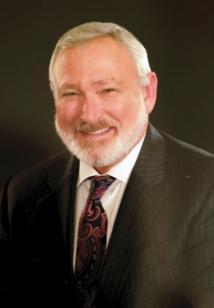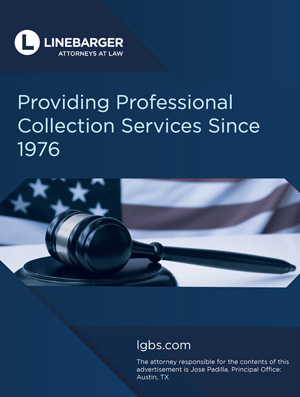
For 42 years, Kevin Bowling has had a career in courts, and he is a people person. So, it was a surprise when nobody tipped him off about his receiving the highest honor from the National Association for Court Management this June, the Award of Merit. Michigan’s Ottawa County trial court administrator and attorney referee for the 20th Judicial Circuit Court and Probate Court had a humble way of explaining the recognition he now shares with past recipients, the colleagues he has admired for what they too have accomplished in the world of court management. He said, “It is fair to say I’ve been around the court world for a long time.” The Award of Merit is not conveyed for years of service but, rather, is a reflection of distinguished service and outstanding contributions to the profession of court administration over a career dedicated to the profession. A past president of the National Association for Court Management, co-chair of the COSCA/NACM/NCSC Joint Technology Committee, and chair of the DOJ Global Advisory Committee, Kevin Bowling has made an impact.
Part of why he has been able to do this is because he has court experience from a variety of different perspectives. “My legal career started at seven,” he explains, “As a juvenile delinquent in the system.” His description of court from that time is of a place where court staff thought they were there to serve the judge and not the stakeholders, the public. “People deserve a better level of service,” he says. He has made that his call to action and focuses on public accountability with his team. For him, service does not begin and end in the courtroom. It extends to the clerk’s office and every point in between. Each interaction is an opportunity for people to understand courts have an important role in the community to improve quality of life and to touch family lives. He says, “In some cases, we help people be better parents, provide resources in juvenile delinquency cases, and ensure respectful treatment in criminal dockets, supporting people who need a second chance while keeping unsafe people apart from those they would harm.”
Courts have a big responsibility, one he does not refrain from sharing. “Working in court is not only doing the good work but also in letting folks know what we do and why we do it.” For that reason, he is involved in Law Day activities, which have been extended into Law Week. The court has mock trials with school children and citizen law school, which adults in the public can attend at no charge. It is important to him to reach young people so they can consider court management as a career and better understand the court system and how they can influence it. He includes outreach as an integral part of the strategic planning process. From frontline workers to chief judges, they all review the plan and talk about goals and objectives, one of which is community outreach.
Another part of that strategic plan is employee development. “Courts are an employee heavy system,” he says, “Not like a private company where inventory sits on a warehouse shelf. Most resources in courts are the people.” In his experience courts have 70 to 80 percent of their budget in personnel, but this coequal judicial branch often receives less than 1 or 2 percent of government funding. This is important because crises at courts can center around people, such as dealing with labor unions or those employees who are not as committed to the mission of the courts. He says, “One of the most important goals of the court manager is learning how to better train and motivate staff to make them successful in what they do.”
For this, Kevin Bowling feels it also falls on staff for them to update their own skills. “Educational opportunities in court management are more in reach today than ever before,” he says. “Anyone in the courts should understand courts are different today than they were 50 years ago. We want workers with a knowledge base, who have developed a certain level of expertise, but this is not a factory. We deal with people’s individual problems and situations.” He underscores the fact that as the world changes, work evolves. Knowledge is interconnected. A court employee might see something on YouTube or a TED Talk and be better adept at environmental scanning within the court world. A broader government and even private-sector perspective can better inform possibilities for courts in a rapidly changing time.
Kevin Bowling suggests NACM as a professional resource and a collegial organization where staff can develop their skills. “NACM has a great mentor program,” he says. “Court systems also have mentor programs. Find a peer group of folks dealing with similar issues and crises who can talk with and understand the kind of environment you work in. Courts need to develop an ethos as a lifelong learning organization. Talent management programs in courts are important. If we take the time to recruit, hire, and onboard someone, we need to make the ongoing effort to support the development of the staff person. Things like classes, brownbag lunches, tuition assistance, encouraging involvement in NACM, taking advantage of online webinars, and providing ICM classes help not just the employee but courts as a whole.”
It sounds like a lot, but he is not suggesting something he has not done himself. He has worked hard for his education. His court system experience during his youth was not ideal. So, at a young age, Kevin Bowling decided to do something about it, which involved many years of laboring to support his educational development. He stops short of recommending exactly what he did, which was working full time while attending school full time for eight years straight. He earned a political science B.A., and then an M.S. in judicial administration, and a J.D. Although he considered becoming a juvenile law advocate or defense attorney for young people, he felt court administration was a better way to direct his energy. As it was a relatively new field, there were opportunities to be a tool for positive change in the court system. Among his other credentials and as further indication of his commitment to education, he is also a Fellow of the Institute for Court Management.
When discussing challenges courts face, he approaches times of crisis as opportunities. It is helpful to anticipate changes and to get involved in guiding adaptations early into a process. In this way, he became involved early on in planning court facility construction projects. This allowed for a different level of infrastructure that in turn provides a better level of service for those served by the facility. With Kevin Bowling, talking about building a facility circles back to the people who use it. He says he learned a lot about management by helping with wage and classification studies requiring him to visit courts across a large region. The project was related to equitable pay for court employees, but learning about the employees improved his organizational effectiveness immensely. “I had to do a lot of desk audits and ignore the job descriptions,” he says. “I’d ask people to help me understand what they do versus their job description. Going through that process, I learned there’s a lot to be said for the personal factor and developing relationships to make things happen.” He also learned a lot of technical detail for many court jobs. He feels the interest a manager or supervisor has in what other people do is important. He says, “A lot of people go to work with blinders on trying to be best at their particular job, but courts are so interrelated that knowing why it works the way it does and who does what can make us more effective at our own job and better able to serve the public.”
While serving the public is important, Kevin Bowling has also been an active and dedicated member of NACM, rarely if ever missing a conference call. He values the relationships he has developed through NACM and has found in them a source of support over the years. When he was dealing with a recent illness, he felt his connections through NACM were a huge factor in his recovery as the friends and colleagues he gained over the years supported him at a dark time. With his health now improved, Kevin Bowling does not deem receiving the Award of Merit the end of a career. He has a daunting schedule of current projects and an impressive array of unfinished business to occupy him. But with the added perspective gained from his recovery, he is considering other important things like sailing, taking vacations, and creating a healthy work-life balance. He says, “Sometimes, it is enough to make a good effort today. Tomorrow will come soon enough.”
For someone who had such a negative perception of courts at a young age, it may be a wonder why Kevin Bowling ended up where he did, except for one thing. He explains it was not the court system or how he was generally treated by staff which yielded a formative intervention righting his path. For the most part, those interactions were not positive. He explains it was one individual judge who made an impact. He describes having the opportunity to tell him that, going back after law school when he had gotten his license to practice. “We had lunch,” he says, “And I got to tell that judge he made a difference.”
So has Kevin Bowling.
ABOUT THE AUTHOR
Paul DeLosh is director of judicial services, Supreme Court of Virginia, and a past president of the National Association for Court Management.



